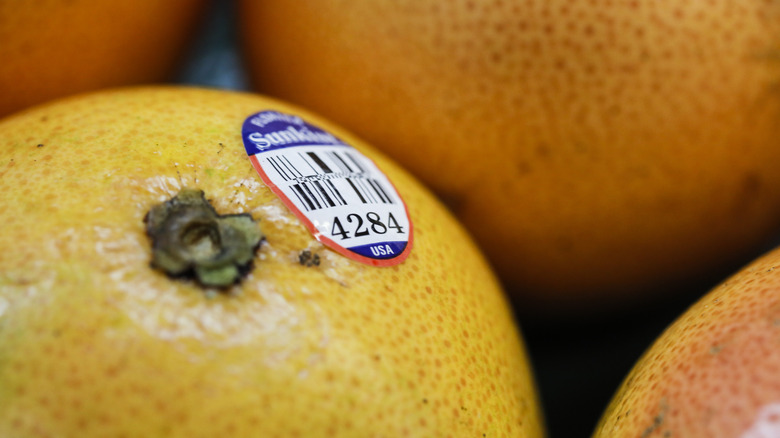Why It Pays To Find Out Where Your Produce Actually Comes From
Shopping for produce at the grocery store can be an overwhelming experience. What does the word "organic" mean anyway? And how much does it matter if that pomegranate is in season or not? There's a lot to think about in this section of the store, but some questions are worth asking over others. One question you should be asking is: Where is all of your produce actually coming from?
It's important to know where your fresh fruits and vegetables are grown, and the reasoning stems beyond peace of mind. Produce that comes from a nearby location is much more likely to be flavorful and ripe. That's because local farmers don't have to ship their fruits and veggies long before they are ready to eat so that they can survive the journey.
Fruit at your grocery store that comes from far away most likely won't be at its peak freshness. Additionally, produce from far away might have sustained some damage during shipping. Here's how you can distinguish between local produce and all of the other stuff.
How to find out where your produce is coming from
As frequent perusers of the produce section know, most fruits and veggies are labeled with a sticker that displays their place of origin so you can easily identify where they came from. If you haven't paid attention to that label before, now might be the time.
Still, not every store is the same, and some produce might simply not be displayed with any sort of identification — or, maybe its label is just not specific enough for your tastes. For moments like this, don't be afraid to ask a grocery store employee for help. After all, it's been proven that asking for help is a sign of strength, not of weakness. Grocery store employees can help you better figure out where exactly your produce of choice is coming from so you can ensure that you're getting the freshest stuff possible.
While it's nice to know that your produce is fresh, it's not the only good reason to shop local. Here are a few more.
More reasons to shop local
Shopping for local produce is a good idea, and it comes with advantages other than freshness. Shopping for local produce means you'll be eating seasonally, which ensures you are getting produce that is full of the absolute best nutrients and flavor. To double-check what's in season before you go shopping, read a seasonal produce guide or two.
Seasonal picks aside, food that's grown closer to you also has a lower chance of being contaminated, since it doesn't need to travel as far in trucks or sit in distribution centers. Local farmers can also tell you exactly how your produce was grown, harvested, and shipped, so you don't have to question anything about your produce. Peak flavors and health factors aside, shopping local also helps stimulate your local economy which results in more flourishing businesses in your town.
Now if you really want to ensure that you're getting local produce, switch your trip to the grocery store up every now and head to a local farmer's market instead. Otherwise, make the trek to a grocery store near you. Just make sure to pay close attention to those labels.


